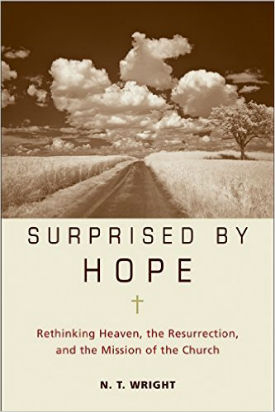 Dr. Michael Morrison
Dr. Michael MorrisonBy Dr. Michael Morrison
 Dr. Michael Morrison
Dr. Michael MorrisonChristian preachers are famous for asking the question: “If you died tonight would you go to heaven?”
And the subject of the afterlife is as big now as it ever was. Today I want to show that the important thing about the afterlife is not where it is but what it is. To reverse the well-known real estate slogan: The important thing is not location, location, location but who we will be with, and how, and why.
A series of New Testament scriptures make this clear.
Philippians 1:23-24, “I am torn between the two, I desire to depart and be with Christ, which is better by far; but it is more necessary for you that I remain in the body.”
I Thessalonians 5:10 “He died for us so that, whether we are awake or asleep, we may live together with him.”
1 Thessalonians 4:17 in the context of what some call the Secret Rapture the upshot is “And so we will be with the Lord forever.”
1 Corinthians 13:12 says we will ultimately enjoy a “face to face” relationship with Jesus Christ our Lord.
 Interracial church service in Glendora depicts reconciliation at Black History Month.
Interracial church service in Glendora depicts reconciliation at Black History Month.
So God’s plan for us is to have relationship with him in the future. It is clear that the key question is WHO not where. This is confirmed at the end of the Bible where we are promised in Revelation 21:1-4 that in the New Jerusalem “the dwelling of God is with men, and he will live with them. They will be his people and God himself will be with them and be their God.”
In fact a New Testament scholar named N.T. Wright has been trying to teach his fellow Anglicans that they are not going to end up in heaven but here on the earth – the New Heavens and the New Earth, something our church was teaching 40 years ago.
Salvation then means life with Christ – enjoying his quality of life, not a life of sin.
Obviously no one will be in the Kingdom enjoying eternal life with Christ who doesn’t really want that, or is uncomfortable at the very thought of that. As the writer C.S. Lewis said, “In the end there are only two choices: Those who say to God, Thy will be done, or those to whom God says, Thy will be done.”
God will not force people to embrace his plan for human salvation. Especially since the promise pertains to WHOM, not where or when.
 Bishop N.T. Wright asks fellow Anglicans to revise their view of Heaven.
Bishop N.T. Wright asks fellow Anglicans to revise their view of Heaven.But eternal life with Christ is but one side of the discussion; the other is eternal life with other people, our brothers and sisters in the faith. That we may be able to handle. But what about those who have hated us, injured us or offended us and drastically altered our lives? Will the soldier Uriah whom King David manipulated to his death – will he lkook forward to an eternity together? Will the first martyr Stephen who was assigned to execution by Saul (later St. Paul) be comfortable in the presence of those who killed him?
Repentance comes in here and that means Jesus is still the key. Our unity is in Christ. In order to fit us for salvation he will have to “scrub out” all the sins and vicious attitudes from our character. Hostility to one another is a very big sin and one that Christ died for. We will have to not only embrace that forgiveness but to submit to the cleansing process that will transform the lion into the lamb and the ox into the tame animal eating straw. (There is perhaps hint of this that speaks of the “spirits of righteous men [and women] made perfect” in Hebrews 13:23).
A major point about future salvation is the fact that we Christians are to be practicing the future life now. That is the message of the whole New Testament. Knowing what the future is like – peace and righteousness and joy through the Holy Spirit (Romans 14:17) – affects the way we live now.
Paul writes about this transforming process now at work in Christians in Ephesians 2:11-18. He introduces this concept with the word “therefore” which recalls the fact that we have all been saved by grace in the here and now. It is only through what Christ has done that we are set us on the road to salvation. Paul then alludes to the Jew/Gentile split that was such a profound reality in the First Century. Frankly they hated each other, but Paul had good news about what was being worked out in the church, a group made up of both Jew and Gentiles:
“For he himself is our peace who has made the two one and has destroyed the barrier, the dividing wall of hostility.” True reconciliation at last: That was the purpose of Christ’s life and death and resurrection. “His purpose was to create in himself one new man out of the two, thus making peace, and in this one body to reconcile both of them to God through the cross.”
That is a big part of what we mean by salvation. Martin Luther King weekend is a good time to think about the future reconciliation of the human race, whether between white and black, Americans and Iranians or Jew and Gentile.
This is why salvation is more of a spiritual reality than a place in heaven or earth. Let us pray that we all may live lives today reflecting the reality that will be ours in the future. Salvation: eternity with Christ and others achieved through God’s grace by faith.